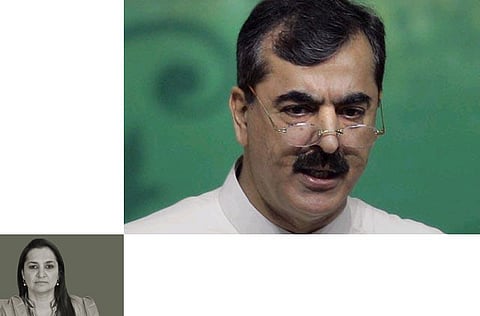Media keeps coup-plotters at bay
Public debate and discussion have emerged as Pakistan's intangible yet consequential power centre

In Pakistan, no coup, military or via the Supreme Court is on the cards, the chaos of a re-setting of the power equilibrium is. As democracy takes root and the various power players jockey for additional power or hold on to the power they wield, the media through discussing threadbare every move, often succeeds in forcing them to operate within Constitutional parameters.
The Supreme Court has not issued a Contempt of Court notice but has called the Prime Minister Yousuf Raza Gilani to explain why a notice should not be served. Gilani is all set to appear before the court on January 19 to explain his position.
In Pakistan, the independent media's exercise of minutely and publicly examining the moves by power players, is in itself both a leveller and a restrainer. Had there been an independent electronic media in October 1999 there would have been no coup.
Examination of every move thread-bare gives a fair share of public hearing and also self-examination, to all the players. Equally, the resulting public censure or otherwise, now informs the power players of the limits of their power, constitutional or otherwise. So while in the coming days we will see and hear some trial ballooning, some real moves, some political rhetoric , some bombastic claims, some propaganda, some shadow boxing as well as alarmist breaking news, but none of this is likely to send the president, the prime minister, nor the army chief or ISI chief packing home.
The government will look towards constitutional and political means to survival, the army will be constrained to act within the constitution and the honourable judges in the Supreme Court will engage with the Constitution within a contextual framework remaining mindful of history and fair-play. This is the spirit in which the memo and the National Reconciliation Ordinance (NRO) cases will be conducted. Asma Jehangir's critique of judgments and the workings of the courts cannot be ignored and neither can the call to respect the judiciary as an arbitrator.
Everyone under scrutiny
Only in the glare of candid and lethal public debate, and the burden of a sordid history, no position or institution, is instinctively or by order graced with public respect. Everyone, in any position of authority, is on trial in today's Pakistan, even the Supreme Court.
The media ensures that the moves of all power players, government, politicians, army, and now the judiciary, are examined for historical precedents, for legality, constitutionality, for double-standards, for individual, institutional and party interests and in some clumsy ways for national interest and logic too. Hence irrespective of which house anyone sits in, which position they occupy, which party they lead, how many corps they command, what weapons they can brandish, what agencies they can use, what bank balance they control, which ethnic card they can play, which foreign country they can lobby, how many votes they can poll, how ‘clean' or patriotic they claim to be, none of their moves or statements can claim immunity to public scrutiny.
Indeed as many will and do complain, the standard of public scrutiny varies. Some who scrutinise may be partisan, some incompetent and others too tedious but all critiques of any move of an individual, party or institution, are injected via the media — print, electronic and social — into public discussion and debate.
It no longer matters which political party, which institution or which agency influences which journalist, analyst, publisher or channel because genuine debates are an equaliser — to be credible they are forced to provide a say to all sides and finally irrespective of what numbers hold what opinion, all opinions in the public realm are scrutinised against the public's inherent common sense, its experiential wisdom and the recall wisdom that the media discussions inject in the public space.
Public debate and discussion, which many are critical of and uncomfortable with, has indeed emerged as Pakistan's new, intangible yet a consequential power centre. Its ways are haphazard, and also in many cases questionable, but it is sections of this media that have ensured that the May 2 Abbottabad fiasco is not hushed up, that Salim Shehzad's killing does not go un-inquired, that Hussain Haqqani is not declared guilty unheard, that a vigorous debate on the pros and cons of the memo issue is being conducted, the list is endless.
And now in this current state of political boil in Pakistan, all power players will be forced to enter this intangible power centre, by introducing their moves to the public through this power centre — whether it is the ISPR press release, the judges' observation, the Prime Minister's China Today interview, or Nawaz Sharif's call for abandoning the government or Imran Khan's call for sending President Asif Ali Zardari home.
As the media debates the issues, presents the pros and cons, often checking them against constitutional requirements and historical precedents, there is some settling of the storm, some calming of the nerves after the storm.
Nasim Zehra is a writer on security issues.
Sign up for the Daily Briefing
Get the latest news and updates straight to your inbox


